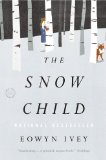Summary | Excerpt | Reading Guide | Reviews | Beyond the book | Read-Alikes | Genres & Themes | Author Bio

Critics' Opinion:
Readers' Opinion:
First Published:
Jul 2007, 384 pages
Paperback:
Mar 2008, 384 pages
 Book Reviewed by:
Book Reviewed by:
BookBrowse Review Team
Buy This Book
First time novelist Stef Penney
shook the British literary world last year when she
won the Costa Award (formerly Whitbread Award) with
The Tenderness of Wolves, not least because
she has never been to Canada and carried out all her
research in the British Library. Although at first
glance it might seem surprising that an author could
write with such authority about a place she's never
been to, it should be noted that no one alive at this
time has been to 19th century Canada either! So,
whether she carried out her research by leafing
through pages in the British Library or wandering
through the trees of Northern Ontario is, arguably,
a moot point.
Having said that, often when an author writes
about a place purely on the basis of research there
are telling missteps or, more frequently, an excess
of background information as the author attempts to
squeeze every last interesting fact into the text.
Penney deftly rises above both potential quagmires -
her detailing of the time is sufficient to provide
ambience without being burdensome and, despite
diligent searching, we've yet to find a review that implies that her grasp of the
period details is anything less than spot-on.
Although there are a multitude of characters and
plot threads in The Tenderness of Wolves
(perhaps, a few too many of both), the central role
is taken by Mrs Ross, who stands out from
the rest of the cast because she narrates her part of the story,
while the rest of the story is told in the third
person. It is she who discovers the brutally
murdered body of the dead Frenchmen and, shortly
afterwards, heads out into the wilderness with an
unknown, part-Indian tracker in search of her
adopted-son, who is suspected of the murder.
As the novel progresses we learn a lot about Mrs
Ross, her past and her fears. She is an agoraphobic
who has learned to handle her panic attacks through
the use of laudanum, from which she is now "clean".
We come to admire the extraordinary
strength it would take for a woman such as herself
to leave the semblance of civilization that is the
settlement of Caulfield (where "what pass
for heroics in a softer world are daily chores") to
go out into the unknown with a strange, possibly
dangerous, man.
Mrs Ross is not the only character to be struggling
with her lot in life. Central to the book is the
concept of the "sickness of long thinking" that
seems to describe a sense of yearning, even
questing, for the unattainable. With a cast of
almost two dozen well-developed characters we see
many men and women struggling honorably and
dishonorably with their lot in life. Like
The Last Crossing by Guy Vanderhaeghe,
The Tenderness of Wolves is a classic "western"
in which the raw and rugged people are dwarfed by
their surroundings as they find their way towards,
or away from, hard-won redemption.
Stef Penney was born and grew up in
Edinburgh. She turned to film-making after a degree
in Philosophy and Theology from Bristol University
and a variety of jobs in the UK and abroad. She made
three short films before studying Film and TV in
Bournemouth, and on graduation was selected for the
Carlton Television New Writers Scheme.
The closest she has been to a frozen wilderness was
a desolate vacation in the Highlands as a child,
when she recalls miserably trudging through mud.
Shortly after leaving university she started
suffering from agoraphobia*. The first panic attack
occurred when she was squashed into the back of a
car during a journey. From then on, any form of
travel triggered an attack. Her greatest fear was of
the panic itself, "It's simply the most frightening
thing I've ever experienced".
It was because of her agoraphobia that Penney
completed all her research in the library without
visiting Canada at all.
Penney became fascinated by what would have happened
to someone like her in the 19th century, before the
age of therapy and safe sedatives. Thus Mrs Ross was
born.
Mrs Ross made her first appearance in a screenplay
Penney wrote about the 18th century Highland
Clearances, when much of the population of the
Scottish Highlands was forcibly evicted from the
land. Nova Scotia, a film based on the
screenplay, was "in
production" with a UK film company in 2007 and
appears to be still "in production" at this time,
which presumably means that production has stalled.
Penney has learnt how to manage her agoraphobia
after trying all sorts of therapy. Finally, she
says, she got so sick of her own limitations she had
to find the courage to overcome them. "But I don't
think I'll ever be 'normal' again - if there is such
a thing."
*Agoraphobia literally translates as "fear of the marketplace". There is a common misconception that agoraphobia is a fear of open spaces but this is not the case. Agoraphobics are not necessarily afraid of open spaces but of having panic attacks as a result of being in certain locations.
Interesting link: Stef Penney talking about The Tenderness of Wolves on You Tube.
![]() This review was originally published in The BookBrowse Review in July 2007, and has been updated for the
April 2008 edition.
Click here to go to this issue.
This review was originally published in The BookBrowse Review in July 2007, and has been updated for the
April 2008 edition.
Click here to go to this issue.

If you liked The Tenderness of Wolves, try these:

by Eowyn Ivey
Published 2012
Alaska, 1920: a brutal place to homestead, and especially tough for recent arrivals Jack and Mabel. Childless, they are drifting apart. In a moment of levity they build a child out of snow. The next morning the snow child is gone--but they glimpse a young, blonde-haired girl running through the trees.

by Gil Adamson
Published 2009
In 1903 a mysterious young woman flees alone across the West, one heart-pounding step ahead of the law. At nineteen, Mary Boulton has just become a widow—and her husband's killer.





The House on Biscayne Bay
by Chanel Cleeton
As death stalks a gothic mansion in Miami, the lives of two women intertwine as the past and present collide.

The Flower Sisters
by Michelle Collins Anderson
From the new Fannie Flagg of the Ozarks, a richly-woven story of family, forgiveness, and reinvention.

The Funeral Cryer by Wenyan Lu
Debut novelist Wenyan Lu brings us this witty yet profound story about one woman's midlife reawakening in contemporary rural China.
Your guide toexceptional books
BookBrowse seeks out and recommends the best in contemporary fiction and nonfiction—books that not only engage and entertain but also deepen our understanding of ourselves and the world around us.